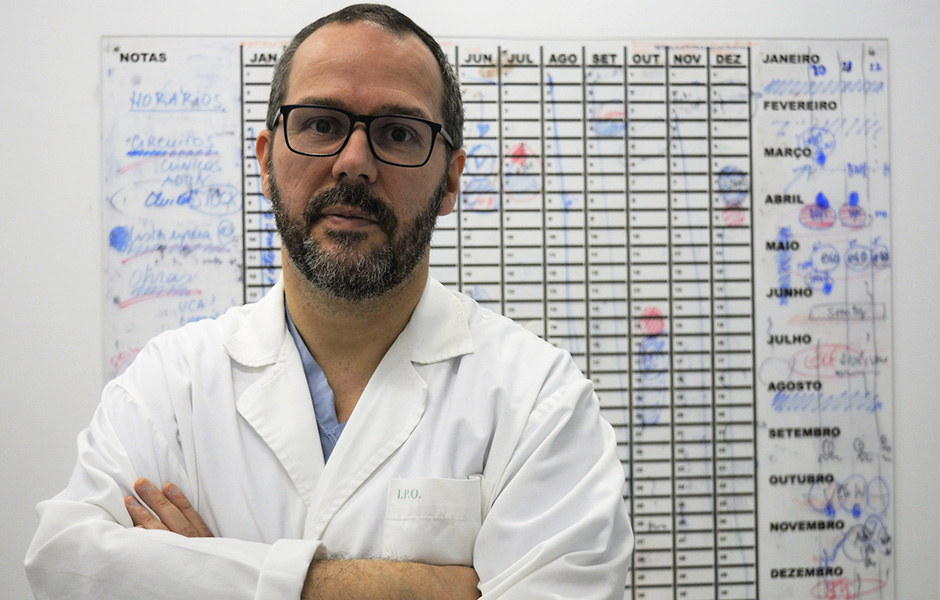His name has been one of the most talked about in recent weeks. Mário Dinis Ribeiro, Principal Investigator of CINTESIS – Center for Health Technology and Services Research, Director of the Gastroenterology Service at the Portuguese Oncology Institute of Porto (IPO-Porto) and Guest Full Professor at the Faculty of Medicine of the University of Porto (FMUP) received the Bial Award in Clinical Medicine from the hands of the President for his work in the field of cancer.
“I must confess I was not expecting it. The visibility was amazing. I received this award as a sign of recognition to what we have been doing for the last 20 years in the field of gastric cancer and upper digestive endoscopy, and also as an encouragement and a challenge for the future,” said the world reference researcher in his reaction to the awarding.
He was born in Mozambique in 1973, but he grew up in Guimarães, his father’s birthplace. He is the youngest of three siblings (the older sister is a physician and the middle brother is an architect). He always wanted to be a researcher, but he might as well have been a mathematician, a computer engineer or a chemist. He was 17 years-old when he joined the Faculty of Medicine of the University of Porto (FMUP), inspired by his sister. The time he spent working at the medical school of Amsterdam left a mark on him, having followed their model since then. Another milestone in his life was the granting of a scholarship of young investigator with Altamiro da Costa Pereira and João Bernardes, which opened the door to clinical research.
He has always followed the clinical course and the academic course in parallel. In 1995, when he was still a student, he was already working as volunteer professor in the field of Biostatistics and Medical Informatics at FMUP. He chose the specialty of Gastroenterology (1999-2003) for the clinical component, but also for the expectation of change, greater access to innovation and the possibility of research. He studied his Doctorate from 2001 to 2005 and was the Director of the Medical Internship of IPO-Porto from 2006 to 2013. He has been the director of the Gastroenterology Service of the IPO-Porto since 2014, and is a professor of the Department of Community Medicine, Health Information and Decision (MEDCIDS) and member of the PhD Program in Clinical and Health Services Research (PDICSS) of FMUP.
In his view, there is only advantages in combining clinical practice with research. “Clinical practice asks the questions, more questions than I can answer. On the other hand, I believe that a doctor who is also a researcher, is clearly not a worse doctor, but probably a better doctor. We cannot generalize, but all structures should have investigation. This is an objective that has not yet been achieved at the national level,” he says.
Mário Dinis-Ribeiro has been a member of CINTESIS since the creation of the unit. He has also been the coordinator of the research group iGO – Health Technology Assessment in Gastrointestinal Oncology since 2013, and since 2018, he is also the Principal Investigator of the Thematic Line 2 – Clinical & Translational Research, a responsibility he assumes with real “spirit of duty”.
IGo is a unique translation research network that brings together researchers from different institutions across the country and is an important partner with the ability to recruit large numbers of patients for multi-center scientific studies to assess different outcomes of new and disruptive technologies in the areas of screening, diagnosis and approach to gastrointestinal cancer.
We are already recognized for our work with patients and in training of doctors. We now want to make the leap and translate this in terms of benchmarking, getting the group to raise its impact factor and achieve projects with greater funding to show that it is possible to have a service that serves the patients in the first instance and also trains professionals and does clinical research. For me, it is paramount that hospitals, especially university hospitals, provide treatment for their patients, but it is equally important to provide training and contribute to knowledge,” he says.
He is the leader of national and international interinstitutional projects and author of about 200 scientific articles, some of which were published in the most outstanding scientific journals in the field of Gastrenterology. He has also been responsible for coordinating scientific societies. Currently, he is the president of the Portuguese Society of Digestive Endoscopy, and president-elect of the European Society of Digestive Endoscopy, a position he will fully assume next April.
1-Year Ambition
My short-term goals are to complete the process of renewal of the clinical service and to try to fulfil a transition phase within CINTESIS, within the research group, and at the academic level.
10-Year Ambition
Maintaining the care we provide to patients from the clinical point of view; try to make the professionals who work with me feel rewarded and motivated; increase the impact factor of our publications, get funds for our projects and join forces.
Life Beyond Teaching and Research
I try to have quality time with friends and family and I try to have time for myself. I like to watch movies, go out with family (the extended and near relatives, that is, my wife), to draw and to paint.

